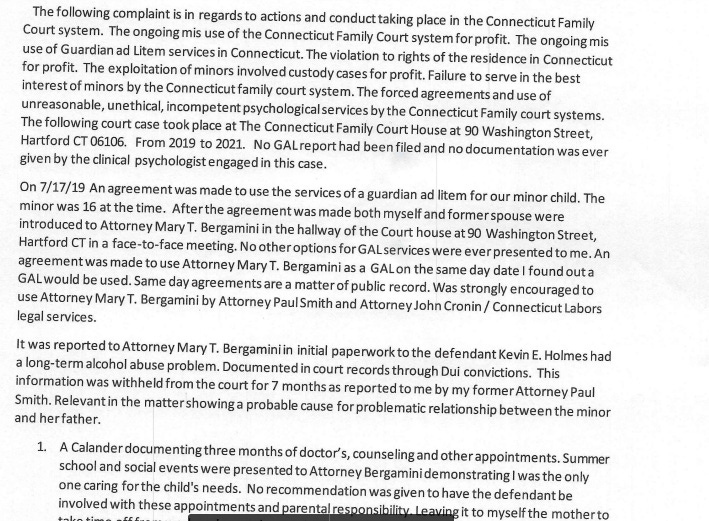Heidi Holmes is my latest guest on the podcast; she is another survivor of Connecticut’s family court system.
When I interviewed Frank Parlato, he referred to the misuse of parental alienation as Connecticut’s “weapon of choice.”
Heidi was also accused of parental alienation.
As she explained, her ex-husband accused her of parental alienation, and, in conjunction, his attorney pushed for a guardian ad litem (GAL): Mary Bergamini.
That GAL would later recommend the appointment of a therapist, Dr. Janet Schrager, and Dr. Shrager would recommend some evaluations.
This is, of course, how the system feeds on itself. It identifies problems and then uses those problems to justify the appointment of numerous court professionals.
Dr. Schrager charged $200 per hour while Bergamini charged $125 per hour, she told.
Heidi told me that Bergamini would attend the sessions that she and her daughter had with Dr. Schrager.
Heidi’s ex-husband’s attorney is an interesting character. His name is John Cronin and he is with the Connecticut Laborer’s Union.
“We can not and would not ever discuss details of a client's case. To do so would be inappropriate and unethical.” The Connecticut Laborer’s Union told me by email.
Heidi told me that her ex-husband’s union dues provide coverage which includes the use of lawyers in family law cases.
Bergamini and Dr. Schrager did not respond.
Bergamini has an interesting past. Here is part of a 2014 article from the Connecticut Post.
Last week, a family court judge in Hartford allowed a guardian ad litem to withdraw from a highly publicized child custody case. The guardian, Enfield attorney Mary Bergamini, asked to withdraw after the father filed a massive complaint accusing her of perjury and ignoring the best interests of his children, among other things.
The father, Eric Stevens, of Simsbury, is upset that his ex-wife, Tiffany Stevens, still has legal custody of their 9-year-old daughter despite her having been charged in 2012 with attempted murder for allegedly trying to hire a hit man to kill Eric Stevens.
Tiffany Stevens has pleaded not guilty and is free on $1 million bail. She and her lawyers have not returned messages seeking comment.
The family court problem in Connecticut is persistent; check out my podcast with another Connecticut victim, Sunny Kelley, whose story is about a decade old.
Heidi explained how the parental alienation came about.
“My ex-husband tried to make me an offer to purchase the home, which I declined.” She told me on the podcast. “When I declined to sell him the home, that’s when the allegations of parental alienation started, and when the Laborer’s Union was requesting a guardian ad litem.”
Heidi said there was a serious fracturing of the relationship between her ex-husband and her daughter, but this was because of his alcohol problem and because he got caught cheating.
The court didn’t see it that way, attributing any problems to parental alienation while forcing therapy on Heidi and her daughter.
During COVID, her daughter was accused of being isolated- as if all kids weren’t isolated during COVID- and Heidi was nearly held in contempt of court after her daughter went some weeks without communicating with her father.
Heidi said that a “family relations conference” was held in January 2021, but neither she nor her ex-husband attended this conference.
One common complaint I hear from people who went through this system is how often the parents are not invited to hearings about their cases.
Decisions are often made behind their backs.
She said as a result, she was pressured into accepting more therapy sessions with Dr. Schrager, even though by January 2021, her daughter was five months from turning eighteen.
At eighteen, she’s considered an adult and would “age out.”
Heidi said after all that, her ex-husband cut off the therapy after two sessions.
She told me that she did not approach the media because she was too scared while the case was ongoing; she’s speaking out now because her daughter has aged out.
Post Script
Check out the previous articles in the series on Connecticut courts: article one, article two, article three, and article four.
Check out the fundraiser for exposing Connecticut courts to see more stories like this.















Share this post